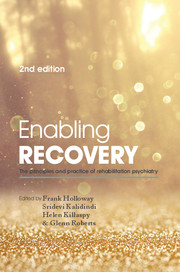Book contents
- Frontmatter
- Contents
- List of contributors
- List of figures, tables and boxes
- Preface
- Part 1 Setting the scene
- Part 2 Treatment approaches
- Part 3 Key elements of a rehabilitation service
- 16 Key elements of a rehabilitation service: overview
- 17 Rehabilitation in hospital settings
- 18 Community-based rehabilitation and recovery
- 19 Housing: a place to live
- 20 Work and employment
- 21 Peer support in mental health services
- 22 Leadership, management and service development in rehabilitation practice
- Part 4 Special topics in psychiatric rehabilitation
- Part 5 Future directions
- Index
21 - Peer support in mental health services
from Part 3 - Key elements of a rehabilitation service
Published online by Cambridge University Press: 02 January 2018
- Frontmatter
- Contents
- List of contributors
- List of figures, tables and boxes
- Preface
- Part 1 Setting the scene
- Part 2 Treatment approaches
- Part 3 Key elements of a rehabilitation service
- 16 Key elements of a rehabilitation service: overview
- 17 Rehabilitation in hospital settings
- 18 Community-based rehabilitation and recovery
- 19 Housing: a place to live
- 20 Work and employment
- 21 Peer support in mental health services
- 22 Leadership, management and service development in rehabilitation practice
- Part 4 Special topics in psychiatric rehabilitation
- Part 5 Future directions
- Index
Summary
Introduction
It is likely that people have valued the support of others who share their experiences and challenges since time began. Whether it occurs in informal friendships, self-help groups or statutory services, mutual support is a key tenet in stories of recovery from all kinds of experiences, traumas and loss. Many such accounts come from people who have mental health conditions (see e.g. Deegan, 1997) and as the value of peer support has been recognised by mental health services, peer support roles have been developing across both the Western world and in lower-income countries. Guidance on peer support workers has been developed along with accredited training in England (Repper, 2013a, 2013b, 2013c) and in Scotland (Scottish Recovery Network, 2011). In the USA, 27 states have collaborated to create a scoping and guidance document for peer support (Daniels et al, 2010). In Canada, standards and guidelines for peer support have been developed by the Mental Health Commission (Sunderland et al, 2013). Peer workers have been employed in various roles and settings in Australia (Franke et al, 2010), New Zealand (Scott et al, 2011), parts of Europe (Castelein et al, 2008) – and although less is published about the ongoing work in the low- and middle-income countries, peer workers are increasingly employed there to augment professional support.
This chapter first seeks to define peer support, focusing largely upon peer support in statutory services, and then reviews the evidence that supports it. It goes on to illustrates peer support in practice, with personal reflections from a peer support worker with 3 years’ experience of employment in in-patient and community mental health services.
Defining peer support
Peer support occurs when people who have common concerns draw on their own experiences to offer emotional and practical support to help each other move forwards. Peer support may be defined simply as offering and receiving help, based on shared understanding, respect and mutual empowerment between people in similar situations (Mead et al, 2001). The ‘shared understanding’ may relate to the specific challenge or symptoms, or it may be due to a common response to a trauma or change (Sunderland et al, 2013).
- Type
- Chapter
- Information
- Enabling Recovery , pp. 324 - 336Publisher: Royal College of PsychiatristsPrint publication year: 2015



